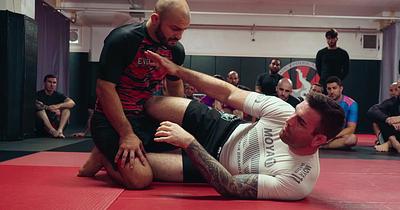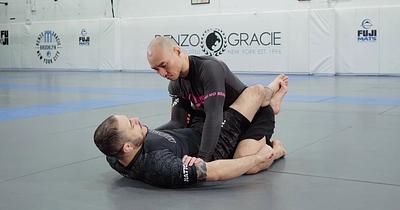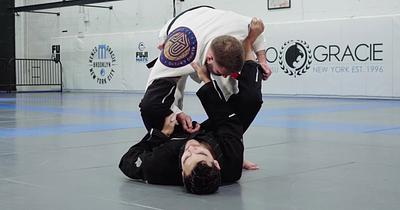Strategies for Improving Your BJJ Skills on a Limited Training Schedule
by Team Digitsu
Updated: April 03, 2024

While most instructors recommend training at least 2-3 times per week to make progress and fully benefit from the art, it is possible to maintain or even improve your skills by training only once a week. However, it is important to implement certain strategies in order to maximize the limited training time. This article will discuss the recommended frequency of BJJ training, the limitations of training once a week, and strategies for maximizing the benefits of this limited training schedule.
The frequency of BJJ training recommended by experts
Most instructors and experts recommend training BJJ at least 2-3 times per week to make progress and fully benefit from the art. This allows for a consistent practice schedule and allows the body and mind to become accustomed to the physical demands of BJJ. It also allows for a more diverse training experience, as there is time to focus on different aspects of the art, such as drilling, sparring, and technique development.
However, the optimal frequency of BJJ training may vary depending on several factors, including age, skill level, and goals. For example, beginners may benefit from training more frequently to build a solid foundation of techniques and muscle memory. On the other hand, more experienced practitioners may be able to train less frequently and still maintain their skills and make progress. Other responsibilities outside BJJ, such as work or family commitments, and the distance to the gym may also affect the training frequency.
The limitations of training BJJ once a week
While it is possible to maintain or even improve your BJJ skills by training once a week, this approach has certain limitations. One of the main challenges is retaining and improving techniques. BJJ involves a vast array of techniques and movements, and it can be difficult to fully absorb and internalize these movements with only one training session per week. It is easier to retain techniques and develop muscle memory with more frequent practice.
Another limitation of training BJJ once a week is the risk of injury. The physical demands of BJJ can put a strain on the body, and without sufficient muscle conditioning and warm-up, the risk of injury increases. Training more frequently can help to build up the necessary muscle conditioning and reduce the risk of injury.
Additionally, training BJJ once a week may provide limited opportunities for sparring and live training, which are important components of the art. Sparring allows practitioners to test their techniques in a live, resistance-based setting, and it is an important part of BJJ training. Without sufficient sparring experience, it may not be easy to fully understand the application and effectiveness of techniques.
While it is possible to maintain or even improve BJJ skills by training once a week, certain limitations to this approach may impact the effectiveness of the training and the overall development of the practitioner.
Training BJJ once a week to maintain skills
As mentioned previously, training at least 2-3 times per week is generally recommended to make progress and fully benefit from the art of BJJ. However, it is possible to maintain close to your current level of skills with only one training session per week.
While training once a week may not allow for the same level of progress as more frequent training, it can help to keep the skills and techniques that have already been learned fresh in the mind and body. Consistent, weekly training can also help prevent significant skills or physical conditioning decline.
Training BJJ once a week will make it easier to return to peak form than compared to a complete break or absence from training. More frequent training allows the body and mind to stay accustomed to the demands of BJJ, making it easier to quickly return to form after a break.
If you aren't able to train as consistently due to demands outside BJJ, maintaining once a week training session will make it much easier to return to more frequent training when possible.
Strategies for maximizing the benefits of once-weekly BJJ training
While training BJJ once a week may have specific limitations, some strategies can be implemented to maximize the benefits of this limited training schedule.
One strategy is to supplement training with conditioning and drilling at home. This can help build muscle conditioning and improve technique retention between training sessions. Simple exercises such as push-ups, sit-ups, and shadow drilling can be done at home with minimal equipment. Watching instructional videos and studying BJJ matches can help you learn and make the most of your limited training sessions.
Another strategy is to seek additional training opportunities outside the regular training schedule. This can include attending open mats, seminars, or private lessons with a qualified instructor. These additional training opportunities can provide extra exposure to techniques and sparring experience.
During the regular training session, it is crucial to focus on specific areas of weakness and make the most of the limited time. This may involve drilling specific techniques or focusing on a particular aspect of the game, such as guard retention or passing.
Being consistent and never missing a week of training is also crucial when only training once a week. Consistent attendance can help to maintain skills and keep the body and mind accustomed to the physical demands of BJJ. Finally, making the most of every training session by staying late and taking notes or reviewing the training afterward can also help to maximize the benefits of once-weekly training.
Conclusion
In conclusion, while it is generally recommended to train BJJ at least 2-3 times per week to make progress and fully benefit from the art, it is possible to maintain or even improve your skills by training only once a week. However, training once a week does have certain limitations, such as difficulty retaining and improving techniques, increased risk of injury, and limited opportunity for sparring and live training.
To maximize the benefits of once-weekly BJJ training, it is vital to supplement training with conditioning and to drill at home, seek out additional training opportunities, focus on specific areas of weakness during training sessions, be consistent and never miss a week, and make the most of every training session.
Don't be surprised when others who train more frequently are progressing faster, as more frequent training allows for a more diverse and consistent practice schedule, leading to more rapid progress in the long run.


